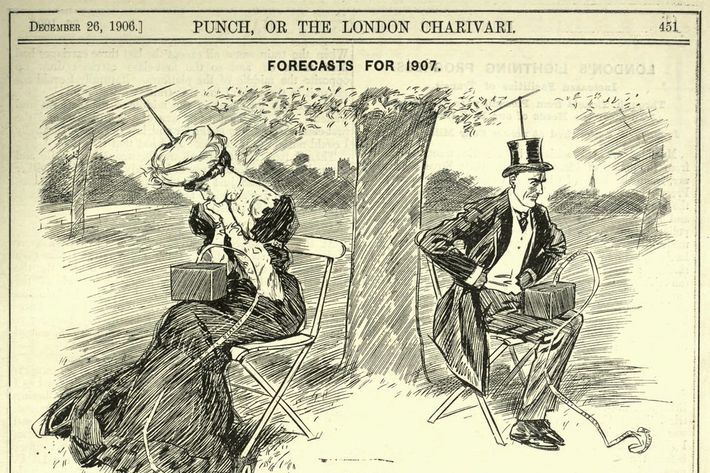
Here are some things that were happening a little over a hundred years ago: People were latching on to a medically dubious fad diet en masse. They were obsessed with their own poop. They were grappling with the most productive way to set up a workweek. They were feeling burned out by the busy state of their lives and seeking ways to disconnect and recharge.
Any of that sound familiar?
Point is, even things that feel especially Zeitgeist-y are rarely completely new — which is why, more than a century before New York ran a cover story on how technology-induced “distraction sickness” was hurting people’s ability to connect offline, the British magazine Punch printed a cartoon lamenting pretty much the same thing.
The cartoon, recently highlighted on the blog Public Domain Review, was published in 1906 as a prediction for the coming year: “These two figures are not communicating with each other,” the caption reads. “The lady is receiving an amatory message, and the gentleman some racing results.”

Look at this thing. Who has not been this couple at one point or another — one of you checking sports scores, the other texting someone more interesting? As the PDR post notes: “Replace these ‘wireless telegraphs’ with smartphones, update the dress a little, and this vision from a 1906 issue of Punch magazine could easily be for 110 years in the future.” (“Amatory message,” by the way, is basically an old-timey way to say sexting.)
It’s a fun little reminder that our modern worries aren’t so modern after all. As Oxford historian Melissa Dickson wrote on the Conversation a few months ago, technology has always been met with trepidation:
In the later decades of the 19th century it was thought that the telephone would induce deafness and that sulphurous vapours were asphyxiating passengers on the London Underground. These then-new advancements were replacing older still technologies that had themselves occasioned similar anxieties on their introduction. Plato, as his oral culture began to transition to a literary one, was gravely worried that writing itself would erode the memory.
And sometime in the future, when we’re all communicating with one another via little chips in our brains, there will be a handful of people silently lamenting the death of the spoken word. Silently, one partner takes in the game; another beams a message to someone out of sight.




